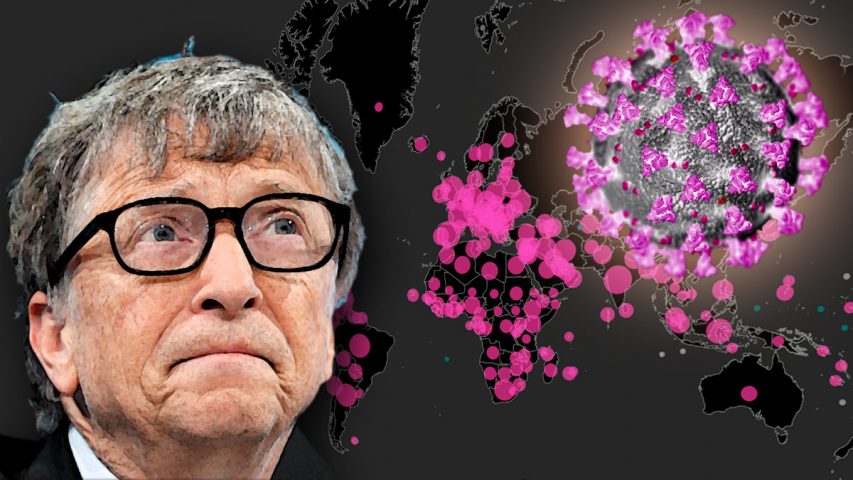- Have any questions? Contact us!
- info@dr-rath-foundation.org

Consuming More Vitamin B3 Can Protect Skin Cells From UV Exposure & Lower Cancer Risk
November 26, 2020
Little-Known Facts About Chemotherapy
December 1, 2020Bill Gates Warns That Another Global Pandemic Is ‘Inevitable’

In a revealing podcast interview with actress Rashida Jones, Bill Gates recently shared his thoughts on what the world may look like after COVID-19 is over. Asked whether another pandemic is inevitable, he answered in the affirmative. “Hopefully, with luck, it could be 20 years from now,” he said. “But we have to assume that it could be 3 years from now.” With Gates having famously predicted a global pandemic in his 2015 TED talk, and then subsequently supported a coronavirus outbreak simulation exercise in October 2019, just weeks before COVID-19 got underway, his warning in this interview that “the next natural epidemic… might have a higher fatality” raises important questions about his motives.
Asked whether he thinks the next outbreak could have less of a destructive impact than the current one, Gates’ reply was equally revealing. “The main reason it will have less destructive impact is we will have practiced,” he said. “We would have done, you know, disease games like war games, and almost every country will respond like South Korea and Australia did, where you’re very quickly testing people and quarantining people.” It is worth our briefly examining the pandemic responses of these two countries, in order to understand what it is that Gates wants to happen.
The South Korean response to the virus has been based on aggressive testing and contact tracing, stringent quarantining, and mass surveillance. Citizens under quarantine in South Korea are monitored via a smartphone app that uses GPS to keep track of their location.
Australians have suffered some of the world’s longest and strictest lockdowns. The city of Melbourne closed businesses and confined residents to their homes for more than three months, for example, while the state of South Australia recently enforced a lockdown in which even funerals and dog-walking were banned.
In his 2015 TED talk Gates states that the best lessons on how to get prepared for a pandemic are to copy what we do for war. He proposes creating a medical reserve corps and pairing medical people with the military, to take advantage of the military’s ability to move fast and secure areas. He states in the podcast interview that it is now obvious these prescriptions will happen.
Natural alternatives to genetic vaccines and drugs
The podcast also features Dr. Anthony Fauci, director of the US National Institute of Allergy and Infectious Diseases. Discussing COVID-19 therapies with Gates, Fauci claims there isn’t anything that can be given early in the course of coronavirus infection to prevent patients from having to be hospitalized. This statement is demonstrably untrue.
Research published by scientists at the Dr. Rath Research Institute in July and August this year has proven that specific combinations of micronutrients are capable of blocking the interaction between the binding site of the coronavirus ‘spike’ and its entry point into human cells – the angiotensin-converting enzyme 2 (ACE2). The interaction targeted in this research is the first step in coronavirus infection and precisely the same biological mechanism that is focused on in vaccines under development worldwide. Significantly, therefore, the micronutrient combinations used in these studies – which include the critical nutrient, vitamin C – are readily available to the public right now.
But with Gates having invested heavily in pharmaceutical approaches to COVID-19, he expects to see a return on his investment. The problem he faces is that non-patentable natural health therapies such as vitamins represent a threat to this. This explains why, in recent years, Gates has sponsored a plan threatening the global harmonization of micronutrient levels in supplements, the setting of which could limit the effectiveness of natural health approaches. He has also been the second largest funder of the World Health Organization, a global body that additionally receives millions of dollars every year from the multinational drug and chemical industries.
Ultimately, of course, Gates is correct when he says that another pandemic will occur. Viral pandemics are a fact of life. They have taken place throughout human history and, until such time as preventive healthcare approaches are implemented on a global scale, will probably continue to do so. But draconian lockdown-based responses, in which the multinational pharmaceutical industry is positioned as a primary beneficiary, are not necessary. Despite what Gates and Fauci would have you believe, there are alternatives to genetic vaccines and drugs. It is time for the people of the world to become properly informed about them.




